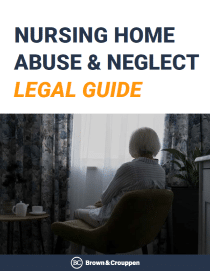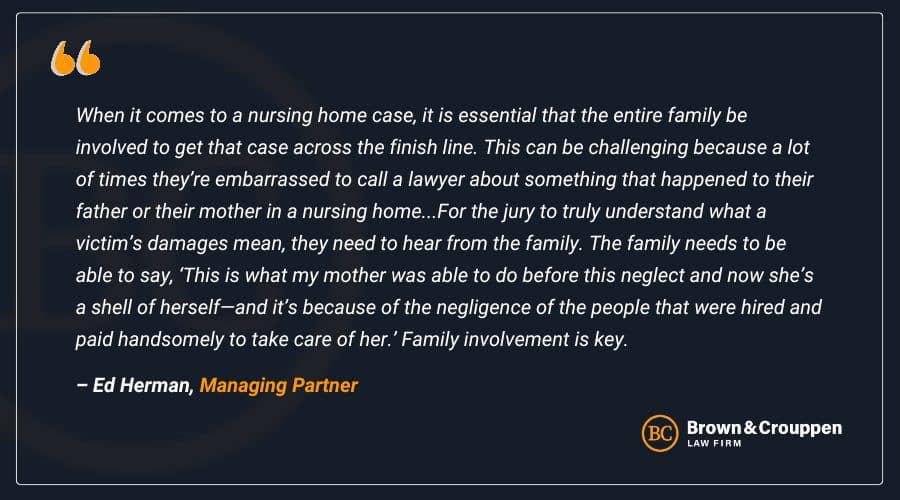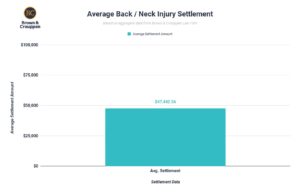If you have a family member in a nursing home, remember that victims often avoid sharing details about their abuse. In some cases, they feel ashamed or don’t want to be a burden on their families. For others, they may simply not be able to communicate what is happening to them. To protect your loved one, keep a look out for these five signs of nursing home abuse:
Signs of Physical Abuse
According to 2024 data from the World Health Organization, 1 in every 6 people over the age of 60 who live in a community setting experienced some form of abuse in the previous year. In cases of physical abuse, less than 3 percent of older adults reported the abuse themselves. About 14 percent of physical abuse was reported with a proxy in institutional settings, and just over 9 percent was reported by facility staff.
Warning signs of physical nursing home abuse include:
- Bruises, welts, abrasions, and lacerations
- Head trauma
- Bone fractures
- Open wounds
- Unexplained falls
- Broken eyeglasses or frames
- Unusual medicinal side effects, such as heavy sedation
- Sudden behavioral changes, including fear or nervousness

Use our guide to learn how to handle nursing home abuse and neglect, along with key legal considerations and insights.
Signs of Sexual Abuse
Nursing home residents are often very dependent on their caregivers. They may be chronically ill, immobile, or have cognitive issues that make them vulnerable to sexual abuse. Unfortunately, less than 1 percent of sexually abused older adults report incidents on their own, and less than 2 percent do so through a proxy in institutional settings.
Common signs of sexual abuse in a nursing home include:
- Bruises or abrasions around the breasts or genitals
- Unexplained sexually transmitted diseases
- Unexplained vaginal or anal bleeding
- Increased anxiety or depression
- Sleep disturbances or restlessness
- Sudden agitation or lack of communication
Signs of Emotional Abuse
Older adults deserve to be treated with respect and dignity. Unfortunately, some staff members or medical professionals emotionally abuse nursing home residents, causing severe depression, anguish, and other psychological harm. Examples include forced isolation, shouting, insults, mocking a person’s disability, or making threats.
Psychological abuse is one of the most common types of elder abuse, with close to 12 percent of older adults coming forward on their own. Over 33 percent of older adults who live in institutional settings report psychological abuse with the help of a proxy, with 32 percent of staff members also reporting emotional abuse of residents.
Signs of emotional or psychological abuse in nursing homes include:
- Emotional distress or agitation
- Withdrawal from daily activities
- Uncommunicative or non-responsive behavior
- Nervous behaviors commonly attributed to dementia, such as sucking, biting, or rocking
- Lack of self-care
- Lowered self-esteem
Signs of Financial Abuse
Fraud or financial exploitation is another form of nursing home abuse your loved one may experience at the hands of a caregiver. When a person accesses and uses funds without the nursing home resident’s knowledge or permission, it is considered financial abuse. Nearly 7% of nursing home residents in community settings report financial abuse on their own, with almost 14 percent of older adults coming forward with the help of a proxy in institutional settings.
Common signs of financial abuse include:
- Sudden changes in bank accounts or banking practices
- Unexplained withdrawals or large transfers
- Abrupt changes to a will or financial documents
- Sudden disappearance of funds or valuable possessions
- Forged documents or signatures
- An unknown person’s name added to financial accounts
- Reluctance to talk about money or financial issues
Signs of Neglect
Neglect occurs when staff members fail in their duty to provide necessary care for nursing home residents. Unfortunately, one study found that an alarming 90 percent of nursing homes are understaffed, resulting in neglect and serious physical and psychological consequences. Over 4 percent of nursing home residents in community settings report experiencing neglect, with nearly 12 percent of older adults in institutional settings coming forward with the help of a proxy.
Common signs of nursing home neglect include:
- Dehydration or malnutrition
- Weight loss
- Untreated bedsores
- Poor personal hygiene
- Missed medications
- Unattended or untreated health problems
- Unsafe or unsanitary living conditions
- Sudden depression or other psychological issues
- Other signs of deterioration in elderly residents

Examples of Neglect in Nursing Homes
Nursing home neglect is a serious issue that can have devastating results for families. If a nursing home fails to prevent abuse or provide the minimum standard of care, you may be entitled to compensation for both economic and non-economic damages.
Our nursing home abuse attorneys have handled numerous cases of nursing home neglect, including the following:
- A neglected nursing home patient developed multiple bedsores and a severe infection.
- A nursing home resident was neglected, which led to serious bed sores and sepsis.
- An elderly patient was not appropriately monitored, resulting in choking, a coma, and brain damage.
- An abuse victim in a nursing home was not treated for bedsores, which led to toxic shock syndrome.
- A nursing home patient was left alone in a dangerous situation and murdered by her roommate.
- A nursing home patient suffered from bedsores and severe burns due to the facility’s neglect.
- A resident was fatally burned during an altercation at her care facility.
- A care facility failed to treat a bedbug infestation, which caused suffering, significant discomfort, and injuries.
If you identify any of the five signs of nursing home abuse discussed above, do not hesitate to act quickly, as doing so could save your loved one’s life. Our attorneys can report nursing home abuse to the appropriate authorities and help you understand your full legal rights and options.
Nursing Home Abuse Risk Factors
Some older adults have a higher risk of suffering abuse and neglect in nursing homes due to their condition or their caregiver’s abilities. Caregivers are more likely to perpetrate abuse if they:
- Suffer from depression
- Have a diagnosed mental illness
- Use drugs or alcohol
- Have a current health problem
- Have poor coping skills
- Are socially isolated
- Lack of support or help from others
- Are underqualified to care for the patient
- Are stressed or burnt out
- Do not find caring for a senior to be fulfilling or rewarding
Additionally, nursing home residents may be more likely to experience abuse at the hands of negligent caregivers when they:
- Are highly dependent on the caregiver
- Have multiple health issues that require highly skilled care
- Have dementia or are unable to communicate clearly
- Do not have family or social support
Speak With Our Skilled Nursing Home Abuse Attorneys
Quality of care varies widely in Missouri nursing homes. If your family member was abused or neglected while living in a care facility, you may have grounds to take legal action in pursuit of justice for what happened. Our legal team can help.
Our award-winning personal injury attorneys serve nursing home abuse victims in St. Louis, Kansas City, and throughout Missouri. We have decades of experience helping victims and their families fight for the accountability and compensation they deserve. Contact us online or call (800) 536-4357 today to schedule your free, no-obligation consultation.








